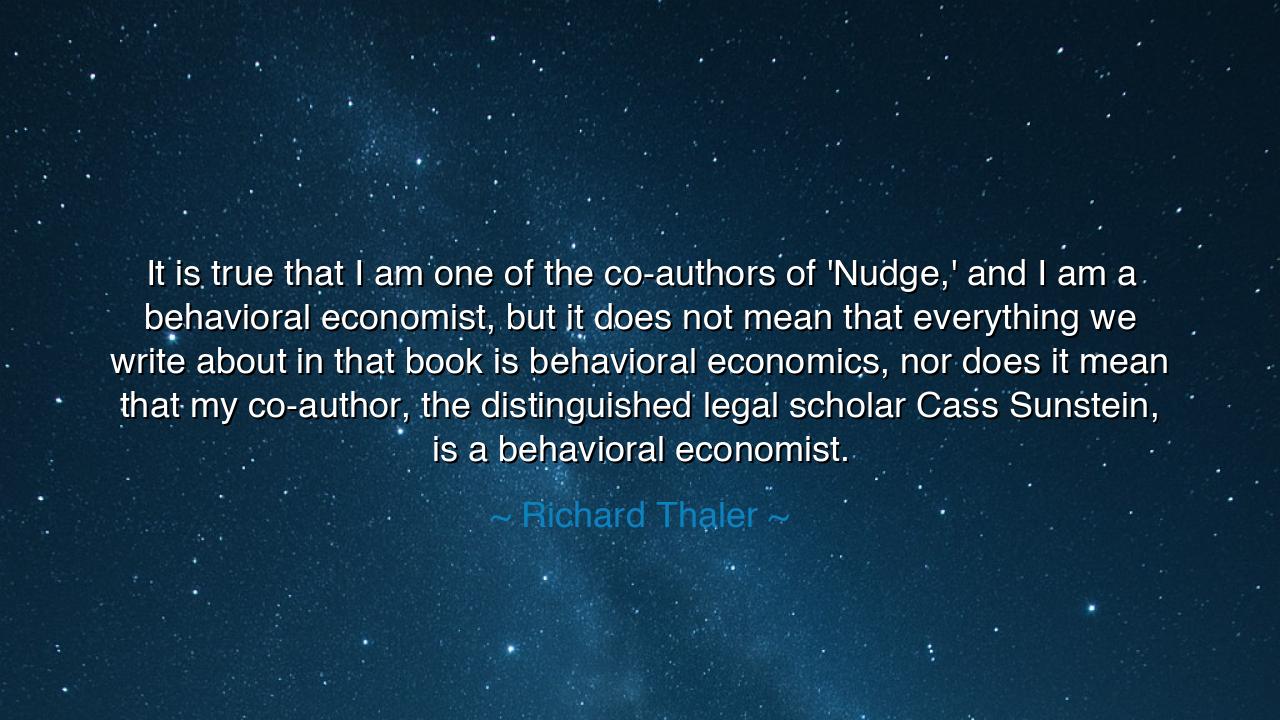
It is true that I am one of the co-authors of 'Nudge,' and I am a
It is true that I am one of the co-authors of 'Nudge,' and I am a behavioral economist, but it does not mean that everything we write about in that book is behavioral economics, nor does it mean that my co-author, the distinguished legal scholar Cass Sunstein, is a behavioral economist.






The words of Richard Thaler, “It is true that I am one of the co-authors of ‘Nudge,’ and I am a behavioral economist, but it does not mean that everything we write about in that book is behavioral economics, nor does it mean that my co-author, the distinguished legal scholar Cass Sunstein, is a behavioral economist,” flow with the humility of wisdom and the precision of truth. In these words, there is no arrogance, but a gentle correction — the kind that comes from one who knows that knowledge must be rightly understood to be rightly used. Thaler speaks not to elevate himself, but to guard against misunderstanding, reminding us that even great ideas can lose their light when reduced to labels or mistaken for something they are not.
The origin of this quote lies in the ripples of Thaler’s and Sunstein’s groundbreaking work, Nudge: Improving Decisions About Health, Wealth, and Happiness. In that book, they revealed how small and deliberate changes in context — “nudges” — can shape human behavior without coercion, respecting freedom while guiding choice. It was not a work of manipulation, but of enlightened design, born from compassion for human imperfection. Yet as its fame spread, many misread it, folding every principle of choice and decision-making into the realm of behavioral economics, forgetting that Nudge was not only an economic treatise, but a bridge between economics, psychology, law, and moral philosophy. Thus, Thaler’s statement stands as both clarification and wisdom: the truth of a work lies not in its label, but in its purpose.
In his humility, Thaler honors his co-author, Cass Sunstein, whom he calls a “distinguished legal scholar.” This distinction matters. For while Thaler brought the tools of behavioral science, Sunstein brought the architecture of law — the understanding of how society governs choice through rights, structures, and policy. Together, they forged a synthesis of disciplines, uniting the heart of social science with the rigor of legal reasoning. Their collaboration echoes the great intellectual pairings of the past — Plato and Socrates, Locke and Newton — where each thinker tempered the other’s vision, producing a philosophy that transcended its origins. Thaler’s quote reminds us that true wisdom is rarely solitary; it is born in dialogue, in the meeting of minds that see from different heights.
This principle — that truth is larger than the categories we create for it — has been known since the age of the ancients. When Aristotle sought to define virtue, he drew from both philosophy and observation, blending logic with the messy reality of human behavior. When Cicero wrote on justice, he did not claim it as the domain of law alone, but as a union of morality, reason, and civic duty. So too does Thaler remind us that the boundaries between disciplines are but lines drawn in the sand, and that understanding must cross them if it wishes to approach the fullness of truth. In a world that hungers for simplicity, he calls us back to complexity — to the recognition that the most powerful ideas are those that embrace many fields and refuse to be confined to one.
Beyond intellectual modesty, there is also a moral undercurrent in Thaler’s words. He warns us of the danger of misinterpretation — of how easily humanity, eager for easy answers, turns nuanced insight into dogma. The Nudge philosophy was never meant to manipulate, but to empower; never to replace free will, but to refine it. When misunderstood, it risks becoming a tool of control, divorced from its ethical foundations. Thus, Thaler’s reminder is not a mere clarification of titles — it is a defense of integrity, both intellectual and moral. For in the wrong hands, even wisdom can be twisted into folly.
To understand his caution, one might recall the fate of Machiavelli, whose The Prince was written as a study of power, not a celebration of tyranny. Yet for centuries, his name became synonymous with deceit, his meaning lost to the hunger for scandal. Thaler’s statement, though gentler, serves the same purpose: to preserve the soul of an idea from the carelessness of misreading. Behavioral economics, though central to his life’s work, was not the totality of his thought. He asks us to look deeper — beyond labels, beyond academic boundaries — to the truth that wisdom lives in the harmony of disciplines, not the domination of one.
Let this teaching, then, be carried to all who seek to understand: knowledge is not ownership, and no field can claim the whole of truth. Be humble in learning, for even the brightest insight can be dimmed by pride. Collaborate, as Thaler and Sunstein did, with those whose minds differ from your own, for diversity of thought is the forge of innovation. And above all, seek clarity, not acclaim — for clarity, born of humility, endures where fame fades. As Richard Thaler teaches through both word and deed, it is not enough to be right; one must also be understood rightly. In this, the scholar becomes not only a teacher of knowledge, but a guardian of wisdom itself.






AAdministratorAdministrator
Welcome, honored guests. Please leave a comment, we will respond soon